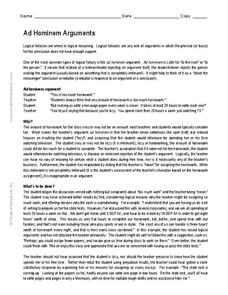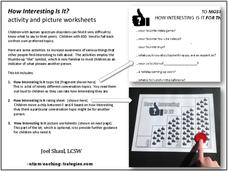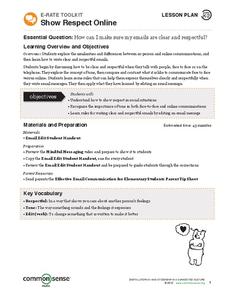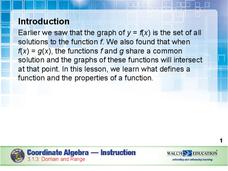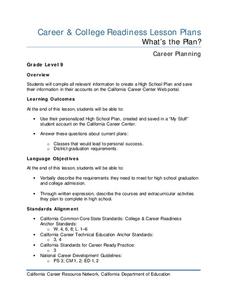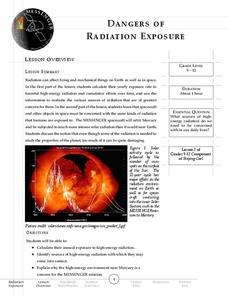Curated OER
Why Do Governments Exist? Locke, Hobbes, Montesquieu, and Rousseau
Here is a great secondary source reading that includes the primary ideas and philosophies of the famed Enlightenment philosophers: Thomas Hobbes, John Locke, Charles Montesquieu, and Jean-Jacques Rousseau. In additional to discussing...
Ballard & Tighe
Mingle and Match
From Michelangelo and Rembrandt to perspective and apprentice, check out this simple matching activity for your young learners to use when reviewing Renaissance key terms.
Judicial Learning Center
American Equality Milestones
Has equality always existed as an unalienable right in the United States? Use this worksheet to chronicle the history and progression of equality in major documents and speeches throughout American history. The graphic organizer asks...
Film English
Moments
Examine homelessness through a series of writing and discussion activities and a short film. Learners first come up with their own stories based on images of characters in the film. They then watch the film and respond to a series of...
Classroom Adventures Program
Creating Characters
Examine character in depth. Over the course of these six lessons, learners explore their own character traits, determine the traits of characters in the books they read, practice comparing and contrasting, and collaborate in small...
Student Handouts
Ad Hominem Arguments
Give your class a lesson in logical reasoning. This activity, which focuses on ad hominem arguments, goes step by step through an example. After examining the argument, learners assess a second conversation for ad hominem arguments...
Curated OER
How Interesting Is It?
Discussing topics that other people are interested in is a key social skill that can often be overlooked. Here is a resource that supports learners in developing this life skill by first prompting them to consider a wide range...
Common Sense Media
Show Respect Online
Through discussion and a variety of worksheet types, pupils learn to review their e-mails for grammar, appropriateness, and respect before sending.
Cincinnati Library
Computers for Beginner
The kids in your class are probably experts at navigating the computer, but do they know the difference between hardware and software? Teach computer skills to any level of computer user with a helpful reference sheet. It...
Curated OER
Domain and Range
Relations, and functions, and line tests, oh my! An instructional slideshow demonstrates the definitions of a relation, a function, and the domain and range of a relation. Viewers then learn how to use mappings and vertical...
American Chemical Society
Norbert Rillieux, Thermodynamics and Chemical Engineering
The man who invented the earliest examples of chemical engineering was an American-born, French-educated, free man of color before the Civil War, and went on to translate Egyptian hieroglyphics. There is something of...
Code.org
The Cost of "Free"
Explore the trade-offs of using a free app. The fourth installment of a 12-part unit helps young consumers discover the cost of receiving a free service. They learn how these apps make use of their access to data.
US Institute of Peace
Practicing Conflict Analysis
Does your conflict management style keep you cool and persuasive, even under pressure? Young behaviorists practice analyzing conflicts and using conflict management skills during lesson five in a 15-part series. The resource contains...
US Institute of Peace
Becoming a Peacebuilder
"Be the change you wish to see in the world!" The 15th and final lesson in a peacebuilding series uses this quote from Gandhi to prepare pupils for their own action projects. Individuals research a global issue, then brainstorm a method...
California Department of Education
What’s the Plan?
What classes should pupils take to achieve their college and career goals? Explore the options through a lesson designed with the future in mind. Fifth in a series of six college and career readiness lesson plans, the activity challenges...
California Department of Education
Exploring Military Career Options
A whole world of career options await in the armed forces! Lesson three in a six-part career and college readiness series introduces eighth grade scholars to military careers. Individuals research the entry requirements for the armed...
Reed Novel Studies
The Incredible Journey: Novel Study
There's no place like home. Three family pets prove this in The Incredible Journey as they head out to find their way back home. Scholars read about the dangers the pets face on their journey while they learn eight vocabulary words from...
Penguin Books
An Educator’s Guide to Ruta Sepetys
Historical fiction novels give readers a chance to step into someone else's shoes. An educator's guide from Penguin Common Core Lesson Plans provides resources to accompany three historical fiction novels written by Ruta Sepetys: Between...
Missouri Department of Elementary
Conflict Mediation – Part 1: Getting Ready
Two scholars walk into a room arguing, what is happening? Peers observe the two actors in preparation for a whole-class discussion about conflict. Learners establish a conflict, name the three approaches—passive, aggressive, and...
K5 Learning
The Blind Men and the Elephant
Sometimes it's necessary to view the whole picture before making a judgment about a small part. Read a short story about five blind men who try to identify an elephant by feeling different parts and coming to their own conclusions....
Pearson
Articles: Indefinite
When do you use a or an before a noun? What about the? Learn about indefinite and definite articles with a brief grammar presentation, which focuses on using context clues to determine proper article usage.
Federal Reserve Bank
Creating a Budget
Learning to create and maintain a budget is an important life skill. Guide individuals in the discovery of their spending habits and how to track them. They then use what they learned to create a budget and make decisions on where they...
Messenger Education
Dangers of Radiation Exposure
Gamma radiation, which is harmful, is useful in treating cancers. In the second lesson in a series of four, young scientists take surveys and calculate their yearly exposure to ionizing radiation. Then they read about how harmful their...
Advocates for Human Rights
The Right to a Clean Environment: Water
First, young citizens learn about water consumption by doing some research themselves on their home water usage and sharing their findings with the class. Then, they do some brainstorming and devise a plan to reduce water consumption.







